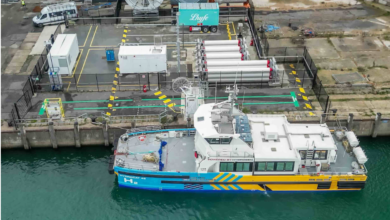Consortium to study production and use of hydrogen at New Chitose Airport
It will study the development and potential of hydrogen-society and local-hydrogen-production technologies.

Mitsubishi Corporation, Mitsubishi Research Institute, Inc., Hokkaido Electric Power Company, Hokkaido Airports Co., Ltd., Nikken Corporation, and Toshiba Energy Systems & Solutions Corporation as a consortium have been selected by Japan’s New Energy and Industrial Technology Development Organization (NEDO) to conduct feasibility studies on the production and use of hydrogen at New Chitose Airport.
The airport is located Southeast of the cities of Chitose and Tomakomai in Japan’s Hokkaido Prefecture and primarily serves the Sapporo Metropolitan area.
The study period will cover June 2022 to March 2023. Through hearings with the concerned parties and literature surveys, these studies shall seek to clarify how hydrogen can be applied throughout the airport and how effective it is compared to other uses of energy, including electrification. The studies shall also assess the possibility of satisfying the airport’s own hydrogen needs with that derived from renewables (i.e. green hydrogen).
Listed below are the main studies that our consortium has planned for the fiscal year 2022:
- Feasibility study on hydrogen demand for mobility, heating and other needs at New Chitose Airport.
- Feasibility study on local hydrogen production and supply.
- Study on optimisation of total energy management systems for hydrogen use.
- Assess potential development and application challenges (business model, technologies, government subsidies, etc.).
Hokkaido Prefecture has excellent potential for developing wind, solar and other renewables. CO2-free electricity that is generated by these sources can be used both directly or indirectly through the production and use of hydrogen. The utilisation of Hokkaido’s vast renewable resources will have a meaningful and lasting impact on Japan’s goal to go carbon neutrality.
The energy needs at New Chitose Airport encompass both mobility and heating, the former referring to Ground Support Equipment and nearby public transportation, and the latter required at facilities like passenger terminals, nearby hotels and other buildings. There is also future potential for hydrogen to be used as aviation fuel. If our studies can confirm that these operations are indeed feasible, then airports may become a hub for hydrogen usage, contributing to exploiting the prefecture’s renewable resources and ultimately developing a hydrogen society throughout the prefecture.
The companies roles are:
- Mitsubishi Corporation: Coordination of studies, business-model assessments
- Mitsubishi Research Institute, Inc.: Studies on hydrogen uses and production potential, independence assessments, business-model assessments and total systems studies
- Hokkaido Electric Power Company: Studies on hydrogen production potential, total systems studies
- Hokkaido Airports Co., Ltd.: Studies on the potential for establishing renewables-related infrastructure,
- in-house studies (concerning the airport and its internal operations, facilities, etc.)
- Nikken Corporation: Studies on hydrogen use potential, business-model assessments
- Toshiba Energy Systems & Solutions Corporation: Management-systems assessments
